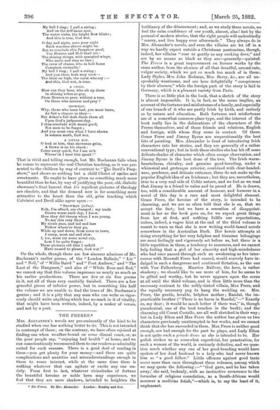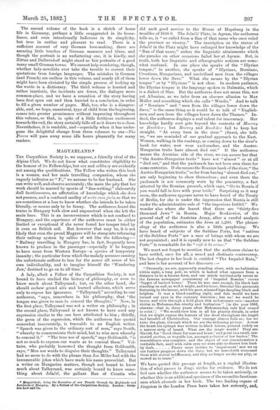THE FRERES.*
Mas. ALEXANDER'S novels are pre-eminently of the kind to be studied when one has nothing better to do. This is not intended in contempt of them ; on the contrary, we have often rejoiced at finding one when weather-bound on some dismal coast, or, as the poor people say, "enjoying bad health" at home, and we can conscientiously recommend them to our readers as admirably suited for such seasons. There is a good deal of reading in them—you get plenty for your money—and there are quite complications and anxieties and misunderstandings enough in them to rouse interest, while at the same time there is nothing whatever that can agitate or excite any one un- duly. From first to last, whatever vicissitudes of fortune the beautiful heroine or noble hero may experience, we feel that they are mere shadows, intended to heighten the
•
The Frerer. By Mrs. Alexander. London : Bentley and Bon.
brilliancy of the denouement ; and, as we study these novels, we feel the cairn confidence of our youth, almost, alas ! lost by the perusal of modern stories, that the right people will undoubtedly "marry, and live happy ever afterwards." They always do in Mrs. Alexander's novels, and even the villains are let off in a way we hardly expect outside a Christmas pantomime, though, indeed, her villains "roar as gently as any sucking dove," and are by no means as black as they are—generally—painted.
The Freres is a great improvement on former works by the same author, from the absence of all that dreadful, second-rate, vulgar society, which we get so much too much of in them; Lady Styles, Mrs. John Redman, Mrs. Berry, drc., are all un- speakably wearisome, and are here delightfully "conspicuous by their absence," while the foreign part of the story is laid in Germany, which is a pleasant variety from Paris.
There is so little plot in the book, that a sketch of the story is almost impossible. It is, in fact, as the name implies, an account of the fortunes and misfortunes of a family, and especially of one branch of it who are partly Irish by birth, and entirely so by nature and education. Both fortunes and misfortunes are of a somewhat common-place type, and the interest of the book really lies in the delineations of the characters of the Freres themselves, and of those friends and relations, English and foreign, with whom they come in contact. Of these, Grace Frere and Jimmy Byrne are unquestionably the best bits of painting. Mrs. Alexander is fond of introducing Irish characters into her stories, and they are generally of a rather conventional type ; but in both these studies she has hit off some delicate shades of character which often escape observation, and Jimmy Byrne is the best done of the two. The Irish warm- heartedness, chivalry, and genuine good-breeding, tinder a whimsical and grotesque exterior, combined with clear-headed- ness, prudence, and delicate reticence, these do not make up the popular English idea of an Irishman ; but they are, nevertheless, true to a very real side of Celtic nature, and we feel as we read that Jimmy is a friend to value and be proud of. He is drawn, too, with a considerable amount of humour, and humour in a novel of this day is a rare and most delightful element.
Grace Frere, the heroine of the story, is intended to be charming, and we are so often told that she is so, that we accept the fact; but we have a sensation of disappoint- ment in her as the book goes on, for we expect great things from her at first, and nothing fulfils our expectations, unless, indeed, a vague hint at the end of the third volume is meant to warn us that she is now writing world-famed novels somewhere in the Australian Bush. Her heroic attempts at doing everything for her very helpless and tiresome belongings are most feelingly and vigorously set before US, but there is a little repetition in them, a tendency to sameness, and we cannot help feeling that a girl of her sincerity and high-mindedness who had once passed through such an awakening as her inter- course with Maxwell Frere had caused, would scarcely have in- dulged in such a dangerous and continued flirtation, as the one with Von Falkenberg. Maurice Balfour, the hero, is rather shadowy ; we should like to see more of him, for he seems to be gifted and worthy, but he never appears upon the scene at all until the third volume, and is then little more than the necessary contrast to the softly-tinted villain, Max Frere, and the equally necessary peg to hang the wedding on. Mrs.
Frere, the gentle, lovable, helpless mother ; Randal, the im- practicable brother (" There is no harm in Randal,"—" Exactly so, my dear ; it would be much better if there was," is, though paradoxical, one of the best touches in the book); and the charming old Count Costello, are all well sketched in their way ; but in Lady Elton and Max Frere the author has given us two characters previously unattempted in her works, and we cannot think that she has succeeded in them. Max Frere is neither good enough, nor bad enough for the part he plays, and Lady Elton is not quite such a grande dame as she is intended to be. Her polish strikes us as somewhat superficial, her penetration, for such a woman of the world, is curiously defective, and we ques- tion much whether any one of her good-breeding would have spoken of her dead husband to a lady who had never known him as "a good fellow." Little offences against good taste occur more than once throughout these volumes, among which we may quote the following :—" God gave, and he has taken away,' she said, brokenly, with an instinctive recurrence to the formulas of religious consolation, as a South-African would murmur a medicine fetish,"—which is, to say the least of it, unpleasant
The second volume of the book is a sketch of home life in Germany, perhaps a little exaggerated in its home- liness, and even intentionally ludicrous in its simplicity, but true in outline and pleasant to read. There is a sufficient amount of very German love-making, there are amusing little touches of German manners and ideas, and though the portrait is an unflattering one, it is kindly, and Zittan and Dalbersdorf might stand as fair portraits of a good many small German towns. We cannot help wondering, though, whether lady-novelists ever take the trouble to correct their quotations from foreign languages. The mistakes in German (and French) are endless in this volume, and nearly all of them might have been obviated by the simple process of looking up the words in a dictionary. The third volume is hurried and rather inartistic, the incidents are fewer, the dialogue more common-place, and we have a sensation of the story having been first spun out and then hurried to a conclusion, in order to fill a given number of pages. Mab, too, who is a disagree- able, and, we hope, unnatural, type of child from the beginning, comes into greater prominence without improving throughout this volume, so that, in spite of a little fictitious excitement towards the end, the story certainly falls off as it draws to a close. Nevertheless, it is readable, and—especially when it has under- gone the delightful change from three volumes to one—The Freres will pass away some idle hours pleasantly for many readers.



































 Previous page
Previous page